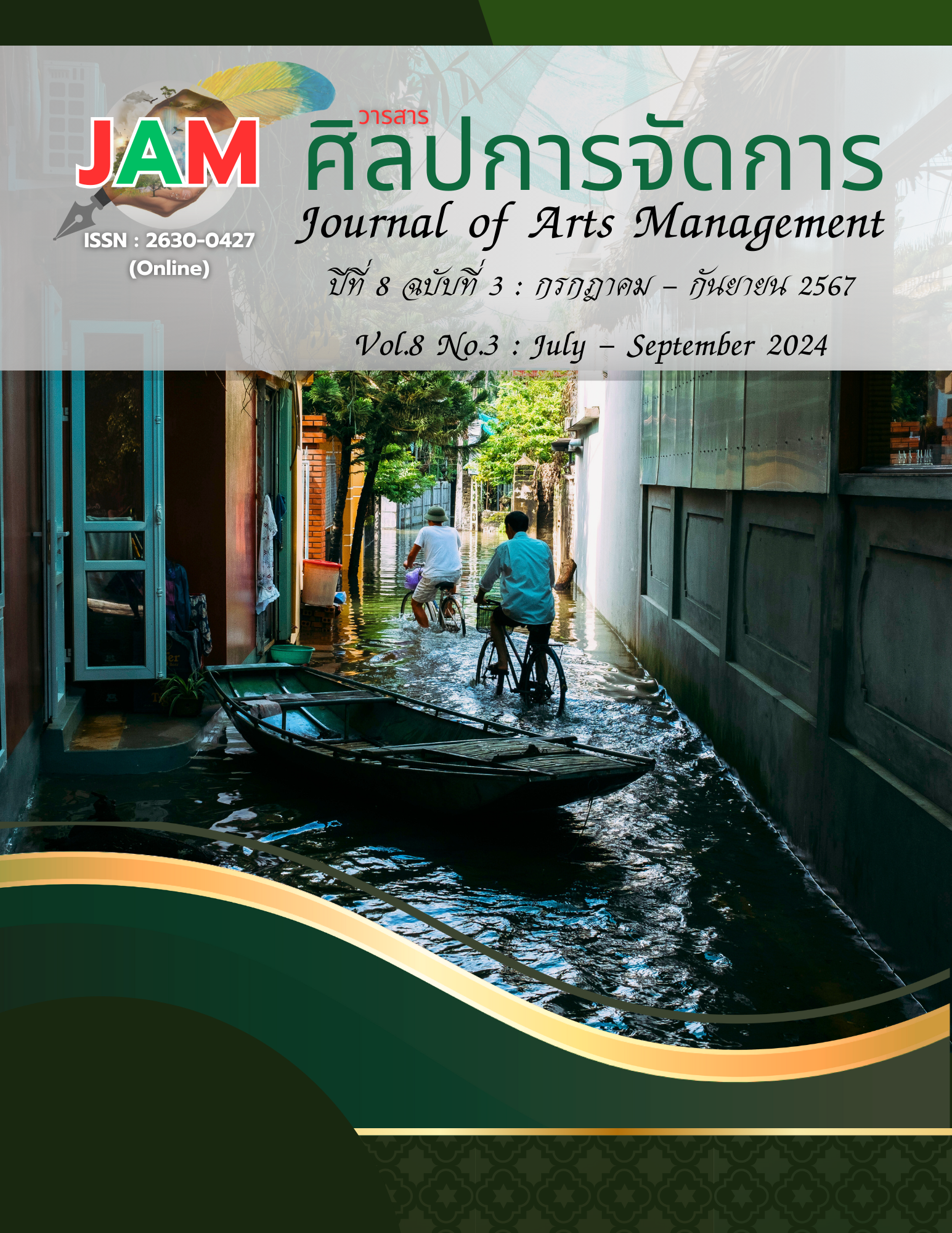รูปแบบการจัดการการเรียนรู้โดยใช้ชุมชนเป็นฐานเพื่อส่งเสริมทักษะการจัดการสัมมนาเพื่อการท่องเที่ยวโดยชุมชน
Main Article Content
บทคัดย่อ
บทความนี้มีวัตถุประสงค์เพื่อ 1) ศึกษาและวิเคราะห์รูปแบบการจัดการการเรียนรู้โดยใช้ชุมชนเป็นฐาน 2) พัฒนาผลสัมฤทธิ์และทักษะการจัดการสัมมนาเพื่อการท่องเที่ยวโดยชุมชนของนักศึกษาในรายวิชาการสัมมนาและประเด็นทางการท่องเที่ยว และ 3) ส่งเสริมทักษะการจัดการสัมมนาเพื่อการท่องเที่ยวโดยชุมชนของประชาชนในชุมชนท่องเที่ยว รูปแบบการวิจัยแบบผสานวิธี พื้นที่วิจัยภายในจังหวัดตรัง คือ 1. ชุมชนบ้านโคกแค 2. ชุมชนบ้านนาหมื่นศรี 3. ชุมชนเกาะลิบง 4. ชุมชนเกาะมุกด์ และ 5. ชุมชนเกาะสุกร กลุ่มตัวอย่างคือ 1) นักศึกษาในรายวิชาการสัมมนาและประเด็นทางการท่องเที่ยว จำนวน 7 คน 2) ประชาชนในชุมชนท่องเที่ยว จำนวน 100 คน ซึ่งมาจากชุมชนท่องเที่ยว 5 ชุมชน ชุมชนละ 20 คน ซึ่งใช้วิธีคัดเลือกกลุ่มตัวอย่างแบบเฉพาะเจาะจง เครื่องมือที่ใช้ในการวิจัยมี 3 ชนิด 1) แบบประเมินผลสัมฤทธิ์และทักษะการจัดสัมมนาการท่องเที่ยวโดยชุมชนของนักศึกษาในรายวิชาการสัมมนาและประเด็นทางการท่องเที่ยว 2) แบบสัมภาษณ์ และ 3) แบบสอบถามเพื่อประเมินผลสัมฤทธิ์และทักษะการจัดสัมมนาการท่องเที่ยวโดยชุมชน วิเคราะห์ข้อมูลเชิงปริมาณโดยใช้ ค่าความถี่ ร้อยละ ค่าเฉลี่ย ส่วนเบี่ยงเบนมาตรฐาน และวิเคราะห์ข้อมูลเชิงคุณภาพ ด้วยกระบวนการวิเคราะห์เชิงเนื้อหา ผลการวิจัยพบว่า องค์ประกอบสำคัญที่ส่งผลต่อการจัดการเรียนรู้โดยใช้ชุมชนเป็นฐานมี 3 ส่วน ได้แก่ 1) องค์ประกอบการจัดการการท่องเที่ยว (7A’s) 2) การจัดการเรียนรู้โดยใช้ชุมชนเป็นฐาน และ 3) ทักษะการจัดการสัมมนาเพื่อการท่องเที่ยว การพัฒนาผลสัมฤทธิ์และทักษะของนักศึกษาทดสอบโดยใช้เครื่องมือประเมินแบบรูบริค และการส่งเสริมทักษะการจัดการสัมมนาเพื่อ
การท่องเที่ยวโดยชุมชนควรพัฒนาด้านระบบสาธารณูปโภค ที่พัก แหล่งท่องเที่ยว และศิลปวัฒนธรรมที่โดดเด่น
Article Details

อนุญาตภายใต้เงื่อนไข Creative Commons Attribution-NonCommercial-NoDerivatives 4.0 International License.
ทัศนะและความคิดเห็นที่ปรากฏในบทความในวารสารศิลปการจัดการ ถือเป็นความรับผิดชอบของผู้เขียนบทความนั้น และไม่ถือเป็นทัศนะและความรับผิดชอบของกองบรรณาธิการ ยินยอมว่าบทความเป็นลิขสิทธิ์ของวารสารศิลปการจัดการ
เอกสารอ้างอิง
Bedri, Z., de Frein, R., & Dowling, G. (2017). Community-based learning: A primer. Irish Journal of Academic Practice, 6(1), 1-26.
Boonyakit, B. (2006). Knowledge management from theory to implementation. Jirawat Express.
Buhalis, D. (2000). Marketing the competitive destination in the future. Tourism Management, 21(1), 97-116.
Choibamroong, T. (2009). The role of local government organizations and sustainable tourism development based on the sufficiency economy concept. Publisher of the Cabinet and the Government Gazette, King Prajadhipok's Institute.
Gustavus Adolphus College. (2023). What is community-based learning: Bridging theory and practice. https://gustavus.edu/kendallcenter/faculty.php
Keawkhum, P., Wongpratum, N., Kankeb, U., Chuminthachak, S., Naiyawat, M., & Hiranyarasmeekul, B. (2018). Community based tourism management Baan Hong Hae. Dusit Thani College Journal, 12(3), 133-149. https://so01.tci-haijo.org/index.php/journaldtc
/article/view/240953
Kerdprng, S. (2011). Seminar. Academic Center.
Khumnuan, S. (2022). Learning management of literary criticism using the community-based: A case study of Lilit Taleng Phai and Wat Suwan Dararam, Phra Nakhon Si Ayutthaya Province. Classroom Research of Srinakharinwirot University, Prasarnmit Demonstration School (Secondary Division School).
Kuakhai, S., Tokaew, W., & Iamnirun, T. (2022). Communications for community-based tourism management in Tamot, Phatthalung Province. Journal Of Southern Technology, 15(2), 1–11. https://so04.tci-thaijo.org/index.php/journal_sct/article/view/249684
Massachusetts College of Liberal Arts. (2023). What is community-based learning. https://www.mcla.edu/a.cademics/undergraduate-education/community-based-Learning/index.php
Niamnak, P. (2011). A development of an instructional model to enhance self-discipline ethics for Rajabhat University Students. The Golden Teak: Humanity and Social Science Journal (GTHJ). 17(2), 85-100.
Niamnak, P. (2011). Technical seminars and training. Faculty of Industrial Technology, Rajabhat University Kamphaeng Phet.
Panich, V. (2014). Learning paths for students in the 21st century. SotSri-Saritwong Foundation.
Panich, V. (2015). Teachers’ skill for Thai students in 21st century learning framework. Journal of Learning Innovation Walailak University, 1(2), 3-14.
Pelasol, J. et al. (2012). Igcabugao: A potential tourist destination in the southern part of Iloilo. JPAIR Multidisciplinary Research, 8(1), 90-97.
Phakdeewanit, J. (2023). The department of tourism develops human resource potential to improve marine safety in Trang Province. https://www.dailynews.co.th/news/2650074/
Phewruangnont, C. (2023). The creation of social media contents on Facebook Fanpage of the community-based tourism Taladmodtanoi. Ramkhamhaeng University Journal Humanities Edition, 42(2), 21–44.
Phukpu, W. (2020). 7 Philosophies of community-based tourism. https://www.randdcreation.com
Piandee, T. (2022). Seminars and selected topic on tourism (Teaching publications). Saun Dusit University.
Rittikoop, W. (2518). Community-based learning: Effective pedagogy strategies for teachers in the 21st century. Graduate School Journal, Chaing Rai Rajabhat University, 11(3), 179-191.
Ruangsang, A. (2023). Community-based cultural tourism at “Nameunsri Weaving Group”, Trang Province. https://www.nationtv.tv/lifestyle/travel/378909248
Rupavijetra, P. (2014). Training and meeting techniques. Duangkamon.
Saengngen, S. (2020). The Ministry of Culture supports a model of virtuous communities at Wat Kanchanaborirak, Trang Province, using the power of ‘Bor Wor’ to drive a peaceful, reconciled and sharing society. https://www.matichon.co.th/publicize/news_2383508
Saksirisophon, P. (2013). Application of project-based teaching (project-based instruction) in the course PT. 480 academic seminar in tourism by focusing on the learner as the center (CIPPA Model) of students in the faculty of tourism development. Maejo University, Chiang Mai (Research report). Faculty of Tourism Development, Maejo University.
Satchukorn, S. (2004). Effective meetings. Saitharn.
Simswat, K. (2022). Community-based learning in the 21st century among the outbreak of coronavirus disease 2019 (COVID-19). Srilangchang Research Journal, 2(6), 47-55.
Sitikarn, B. (2014). Tourism planning: From theory to practice. Santipab Pack-Print.
Sitikarn, B. et. al. (2015). Report on strategic management of sustainable trans-boundary tourism in R3A and R3B route. Thailand Research Fund.
Tanjareon, T. (2017). Community based tourism management and sustainable tourism development of Bangkantaek Community. International Thai Tourism Journal, 13(2), 1–24.
Thinothai, K., & Vinijnaiyapak, N. (2020). Factors influencing success of community-based tourism: A case study of Ban Bang Nam Pueng Community in Samutprakarn Province. Dusit Thani College Journal, 14(2), 217–234.
Yawichai, P. (2010). Seminor. O.S. Printing House.


